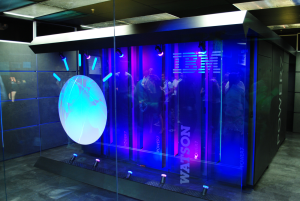The last several years the world has been witness to a surge in technology utilizing artificial intelligence.
While the public’s view of AI is heavily influenced by their experience with the popular icons in the field—asking Siri what the fox says or watching Watson beat Ken Jennings on Jeopardy—the truth of the industry’s breadth and depth is greater than many realize.
Nova Spivack, CEO of Bottlenose, a data-mining firm focused on emerging trends, will join his colleagues Doug Lenat, president and CEO of Cycorp; Fred Brown, founder and CEO of Next IT; and Monica Anderson, CTO of Sensai this spring at SXSW’s Interactive conference to give a state-of-the-union-style address on AI’s place in the current digital landscape.
When asked about the public perception of AI, Spivack agreed that most people are familiar with Siri and Watson but may not realize how pervasive the technology has become.
“[People]  may not be aware that Watson technology is helping physicians with medical diagnosis [or that] major brands are monitoring sentiment on social networks. [New] ‘health coach’ apps are carrying on conversations to understand how people are feeling and whether they’re taking their meds…”
may not be aware that Watson technology is helping physicians with medical diagnosis [or that] major brands are monitoring sentiment on social networks. [New] ‘health coach’ apps are carrying on conversations to understand how people are feeling and whether they’re taking their meds…”
While in decades past, similar technology could only be found in the pages of science fiction novels the current public seems to have accepted such breakthroughs with aplomb.
Spivack referenced esteemed technology analyst Esther Dyson and her work when discussing the attitude of the general populace towards AI.
“AI is what computers can’t do yet. Once they can do it, it’s just part of what computers do.”
The panel will address emerging trends in AI, look at where the cutting edge research and development is taking place and make predictions for the future of the field.
One area that has exploded over the past few years is the concept of Cognition as a Service, or CaaS, for which Siri is one of the most famous examples.
“No matter how smart they get, you can only stuff so much intelligence in a Smartphone,” Spivack explained.
This is why cognitive services, like Siri, need an internet connection. These services, which operate in the cloud and are accessed by the device as a service, will become more and more important as users seek intuitive interfaces through which to collect and organize the vast amount of information available to us.
“A decade from now, I think Cognition as a Service will have reached a point where it’s the operating system of the global, networked brain itself.”
As for where the cutting edge of AI exists, Spivack looks to the cloud.
“I really believe the cutting-edge AI is happening in the cloud where it can scale horizontally and operate in real-time on as much unstructured data as required to detect trends [and] find ‘MoneyBall’ connections that humans miss.”
Neutrality, a concept on the tip of every technologist’s tongue these days, is an issue Spivack sees affecting AI in the future as well.
“One hope [I have] is for neutral cognition platforms. I hope the winner of the coming CaaS war provides something like Amazon Web Services that just provides the underlying services and doesn’t compete with third-party apps that use it.”
Whatever the future holds for AI, it’s clear that the field will continue to impact the world in ways both small and life changing as a research field and as an emerging powerhouse industry.
Panel Details:
Date: Tuesday, March 17
Time: 12:30-1:30 p.m.
Location: JW Marriott
Room 211-212
110 E 2nd St.
Further details on the panel and speakers can be found here.

